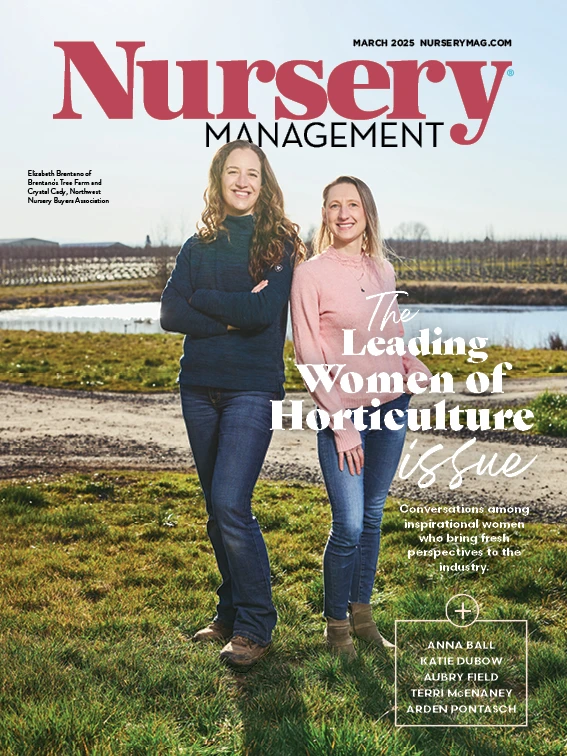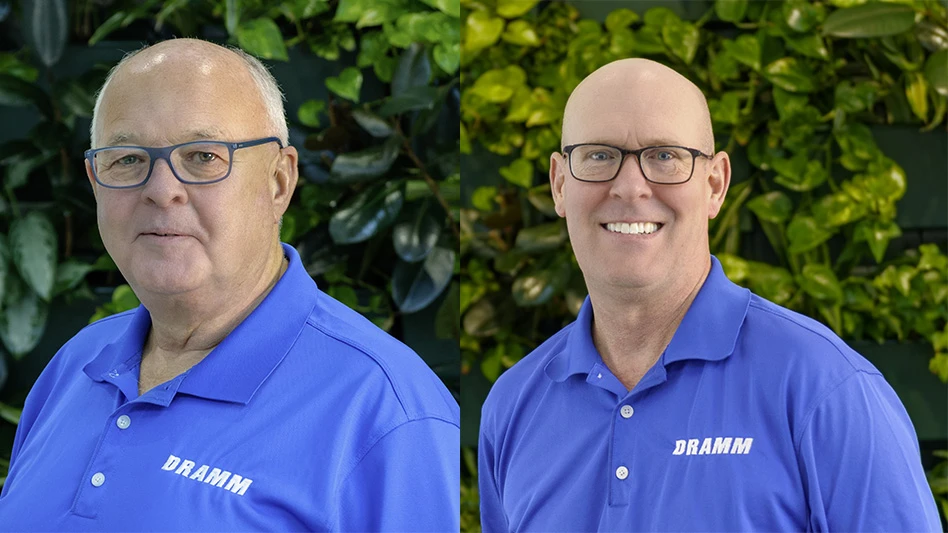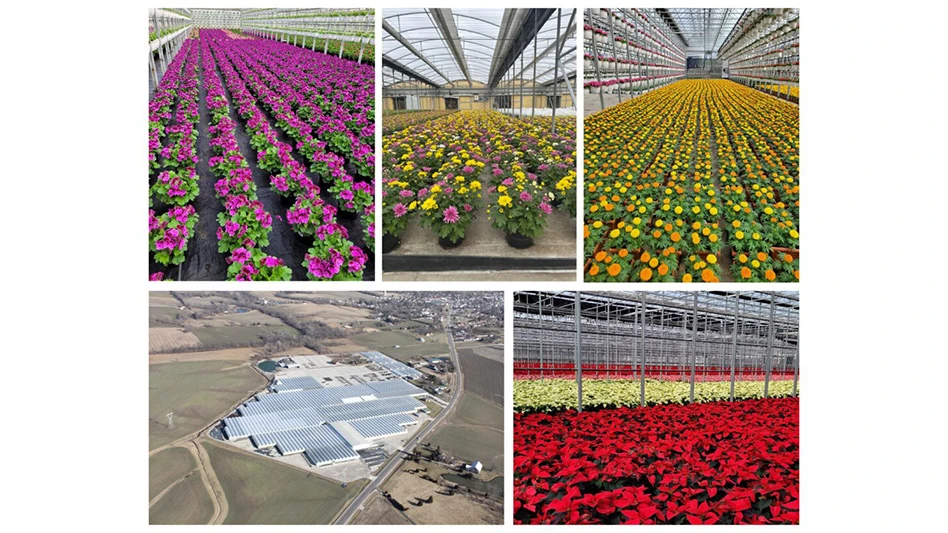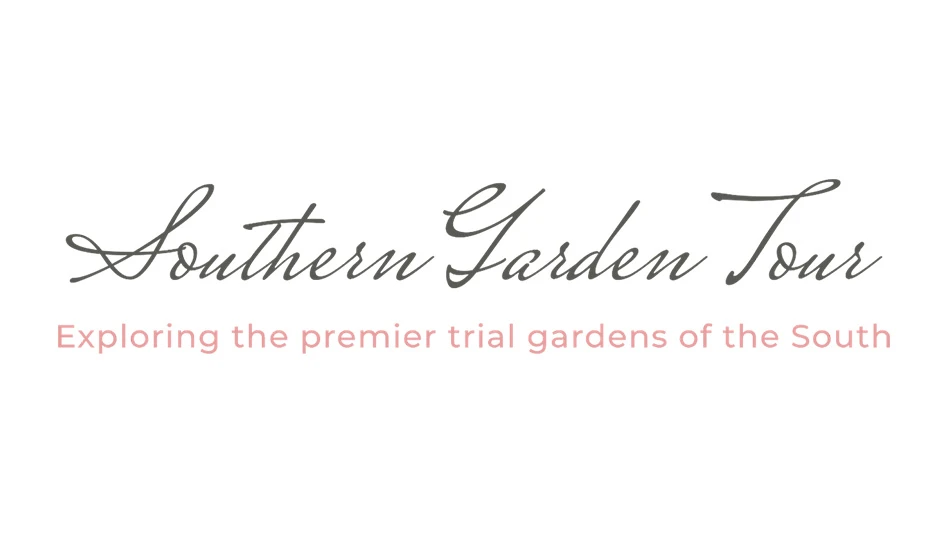While traveling down south, I had the opportunity to visit Griffith Propagation Nursery in Watkinsville, Georgia. It is a wholesale nursery that grows perennial and woody ornamental liners with a focus on new products. The nursery is a licensed propagator for several brands such as Encore Azalea, First Editions, Gardener’s Confidence, Garden Debut, PlantHaven, Endless Summer, Butterfly Candy, Southern Living Plant Collection and Premier Introductions Inc. (PII).

Above: While a student at the University of Georgia (UGA), Mark Griffith (left) started the nursery 43 years ago in his parents’ back yard. He was a student of Michael Dirr (right) and became close friends as the years went by. They decided to start a private plant breeding business (Premier Introductions, Inc.) with their friend Jeff Beasley (middle).

Above left: The nursery has 25 acres of production, half of which is located on an old pig farm. Mark purchased the dilapidated pig farm in 2007. Since then, he has converted the remaining infrastructure into a nursery. A greenhouse was erected over a pig manure pit which improves water drainage and airflow. The plants sit above slotted flooring that allows the water to drain out. At this point, the plants have been pulled from propagation, are rooted and will stay in these houses until they branch out and are ready to ship.
Above right: Mark’s sons Taylor Griffith (left) and Andy Griffith (right) grew up watching their dad at the nursery, and they both joined the family business. They graduated from UGA with business degrees. After graduating from college, Andy worked a corporate job in Chicago and Atlanta, but he wasn’t enjoying working in a high rise.
“The opportunity presented itself to come back, work with the family and carry on the legacy that my dad built, and it’s something I couldn’t pass up,” says Andy, president of operations.
“It’s great to have new ideas and younger minds at the nursery,” Mark says.
Andy enjoys coming up with new ideas and implementing them at the nursery. He recently tried a new shipping method to reduce shipping costs. Taylor’s favorite part of the job is being outside, getting his hands dirty and learning.
“My sons have implemented cost analysis on every facet of the business, streamlined processes from sticking cuttings to shipping and are currently overseeing a $500,000 expansion with a focus on efficiency,” Mark says.

Above: The nursery produces around 10,000 liners of Juniperus cinferta ‘All Gold’ annually. The plants were stuck in late October and will remain in propagation houses with mist and bottom heat for the majority of the winter months. They will be pulled out in mid- to late-March and be ready to sell in May or June. The mist houses utilize the existing infrastructure to provide bottom heat for the winter propagation of various conifers. The heater blows under the flooring and heat rises onto the roots of the plants.

Above: The nursery grows around 200,000 Loropetalum chinense var. rubrum ‘PIILC-I’, First Editions Crimson Fire fringe flower annually. Liners are produced in the Growcoon, a biodegradable mesh. This product allows for easier handling of individual cells and can be left on the liner when transplanting, according to Taylor, vice president of the nursery. They plant 100% of their crops in the Growcoon, which has resulted in labor savings when grading. Taylor explains that using this biodegradable mesh allows air to get in between the plastic tray and the soil, so when you pull up a cell, it doesn’t fall apart. The Growcoons are shipped from the Netherlands and come stacked together in a box which help reduce shipping costs compared to other products that come with the soil. Taylor says the nursery prefers the Growcoon because they can use their own media and have flexibility to change their soil mixture.

Above: The nursery uses a contract driver to deliver plants, and Andy is working on building wooden racks to hold trays instead of shipping the plants in boxes. This method is more sustainable and should save their customers money. “Box prices are through the roof, and the weight is about the same,” Andy says. “We bill at cost, so the customer would have to incorporate that into the overall gross price of their plant. We’ll bring shipping down about 50% on the materials, so saving our customers a good bit there.”

Above: Loropetalum chinense Garnet Flame — A new introduction by PII, Garnet Flame is a dark foliage and compact seedling of Little Rose Dawn. Garnet Flame will be included in the Garden District Collection and available in stores this year. Griffith Propagation Nursery partners with PII to build up numbers and distribute liners to other licensed growers.

Above: Distylium ‘T3-01-22’ Titan PPAF is an upright, large foliage cultivar with copper colored new growth. Titan is part of the new lineup of genetics being introduced by PII as part of the Garden District Collection.

Explore the March 2025 Issue
Check out more from this issue and find your next story to read.
Latest from Nursery Management
- GIE Media Horticulture Group wins five regional 2025 Azbee Awards of Excellence
- Get to know Pat Reilly with NewGen Boxwood and the American Boxwood Society
- Terra Nova Nurseries introduces rust-free and disease-resistant heucherella
- John T. Nickel, founder of Greenleaf Nursery Co., passes away at 89
- Three tours offered at 2025 Farwest Show
- Garden Media Group announces sixth annual Women in Horticulture Week
- Star Roses and Plants announces National Knock Out Rose Day
- The Growth Industry Episode 4: How federal budget cuts are affecting horticulture nonprofits







